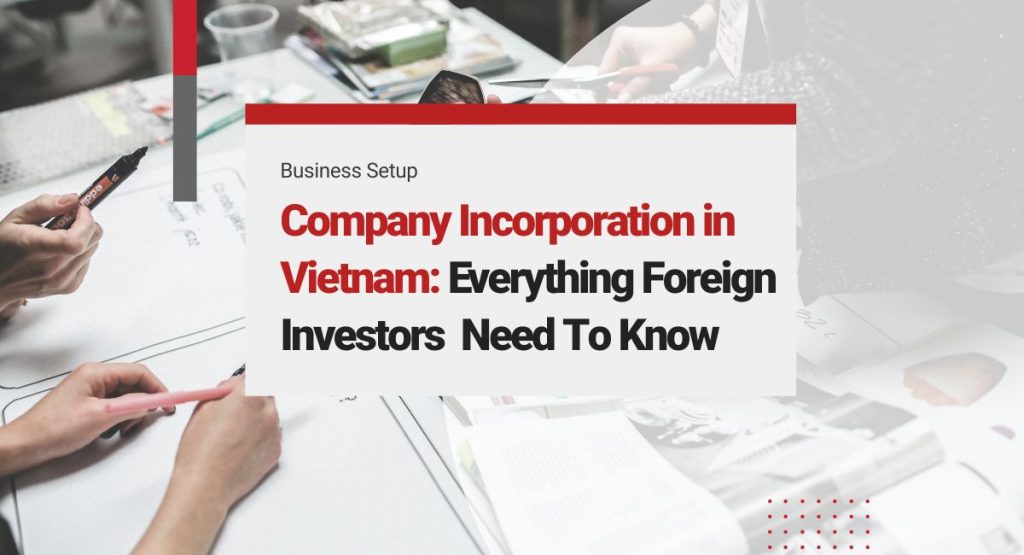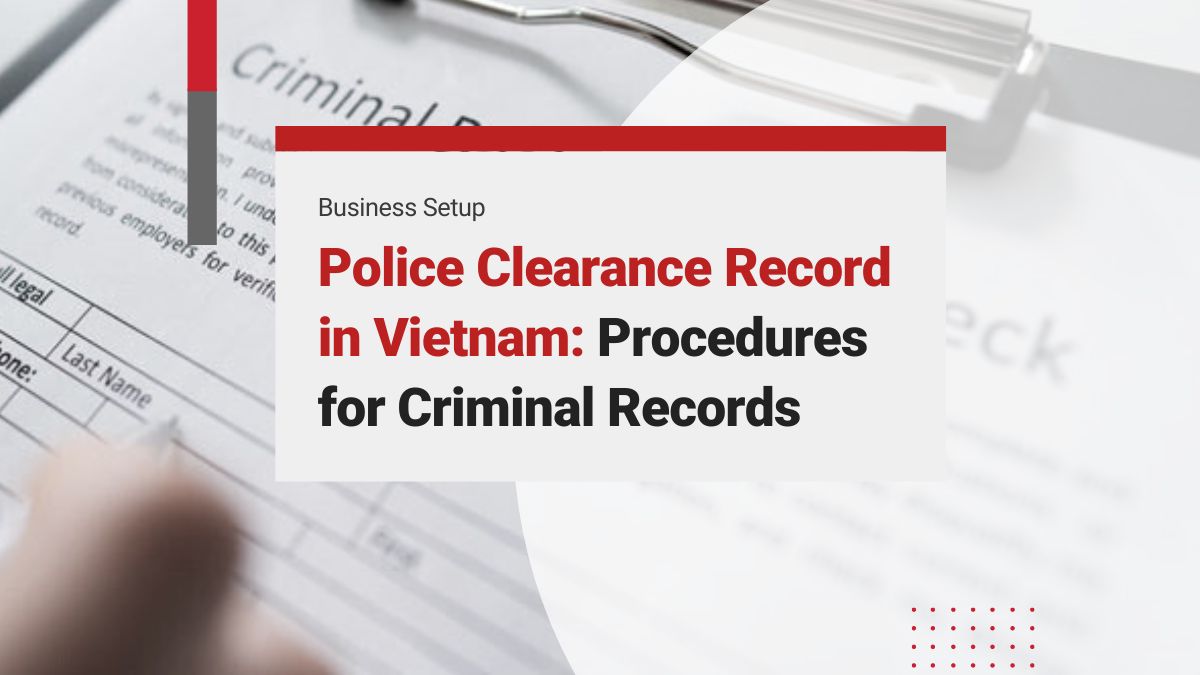Vietnam has turned into a utopia for foreign investors, thanks to the government’s extensive assistance and trade agreements, the growing middle-income groups, and evolving consumer attitudes. The country’s promising economic opportunities act as a catalyst for company incorporation of foreign investors in the country.
This small Southeast Asian country is one of the few that recorded a GDP growth during 2020 and 2021 whereas much more developed countries suffered from COVID-19-induced economic recession.
Setting up a business in Vietnam? Check out InCorp Vietnam’s Incorporation Services in Vietnam
Over the first half of 2022, Vietnam has made considerable progress in recovery with sharp increases in new and returning businesses, as well as commendable efforts from the government to stimulate the economy.
Foreign investment is a key element in Vietnam’s economic growth and capital generation, facilitated by a sustainable supply chain premise and attractive incentives from the government, such as income tax deductions (up to 100%) for tech companies.
Can a Foreigner Own a Business in Vietnam?
Indeed, foreign citizens have the right to expand into Vietnam and do a company incorporation within the country. However, specific restrictions apply: A 100% Foreign Invested Enterprise in Vietnam can only take the form of a Limited Liability Company (LLC) or a Joint Stock Company (JSC).
As a foreign investor interested in expanding your business within this dynamic and rapidly evolving young economy, you must initially acquaint yourself with the process of business formation. To start doing business in Vietnam, you need to create a compliant legal entity. This should take anywhere from one to three months, depending on the entity type.
What are the Options Available for Company Incorporation in Ho Chi Minh City?
Vietnam makes its market highly approachable for foreign investors by providing several business entity alternatives to incorporate during initial investments. Each entity is suited to a particular size of the investment, the number of investors involved, and the motive of market entry. Let’s see what are these options of Vietnam company formations and which one is suited for you:
Limited Liability Company
Considering Limited Liability Company (LLCs) are the most common legal entity due to the reduced risk of liability attached to this type of entity as well as the lower capital requirements., They are particularly fit for small and medium-sized businesses (SMBs) looking to set up or expand to Vietnam. Depending on the structure, an LLC can have a single member or multiple members. The number of members in a multi-member LLC might range from two to fifty.
Representative Office in Vietnam
A Representative Office is preferable for foreigners interested in investigating the business environment and doing market research in Vietnam. Because of its structure, which does not allow for invoicing processing, this type of company proves ideal for staff recruitment and market observation before committing to full-scale expansion. It also enables them to establish a sales network for the parent firm before fully expanding into Vietnam.
Branch Office In Vietnam
An affiliate of the parent company is a Branch Office. You can perform all of your parent company’s business activities and generate profits from your branch office in Vietnam. It is essentially a copy of your parent company with local stipulations applied. You can perform full commercial activities, hire staff and list on the stock market.
Joint-stock Company Vietnam
Joint-stock companies are typically larger and consist of three or more shareholders as founding shareholders. A company’s charter capital is formed by the equal division of its shareholders’ shares into equal units, which are owned by individuals or organizations.
Furthermore, shareholders bear responsibility for the firm’s obligations and liabilities according to their capital contributions. Additionally, a JSC, like a limited liability company, can register as either a wholly foreign-invested or a joint venture company.
Read Related: Top Business Process Outsourcing (BPO) Company: Benefits and Services in Vietnam
Challenges for Foreigners in Company Incorporation in Vietnam
1. Legal framework and bureaucracy: Vietnam has made significant progress in improving its business environment, but navigating the legal framework, obtaining licenses, and dealing with bureaucracy can still be challenging and time-consuming for foreign entrepreneurs. Foreign entrepreneurs should continuously monitor, adapt to, and adhere to new regulations, which may be introduced with little notice.
2. Intellectual property protection: Enforcing intellectual property (IP) rights in Vietnam can be tricky. While the country has IP laws, their enforcement may not always be consistent or effective, making it essential to take extra precautions to protect valuable IP assets.
3. Cultural and linguistic differences: It’s crucial to understand Vietnamese business culture and create personal relationships while building trust with partners, employees, and customers. Meanwhile, the challenging Vietnamese language still used in most documents & procedures. A fully bilingual native legal consultant or secretary can be especially helpful.
4. Finding a local partner: Partnering with a local business or individual can help you navigate the legal, cultural, and language challenges. However, finding a reliable and trustworthy local partner can be a daunting task in itself. Here’s how you can simplify partner & distributor matching with a partner.
5. Human resources and talent: Finding skilled and qualified employees in Vietnam can be challenging, particularly in specialized sectors. Offering competitive salaries and investing in employee training and development can attract and retain talented professionals. SMEs and startups, in particular, can benefit from HR services for efficient recruitment and retention.
6. Infrastructure: While Vietnam’s public infrastructure is improving, issues such as traffic congestion and inconsistent power supply can impact business efficiency, particularly in urban areas like Hanoi and Ho Chi Minh City. Industrial zones in cities such as Bac Ninh are known to have more advanced manufacturing-oriented facilities.
Read More: Choosing the Ideal Business Location in Vietnam: The First Step of Success
Top Business Opportunities in Vietnam in 2023
1. Manufacturing and Electronics:
With a strong manufacturing base, Vietnam has become a hub for electronics production, particularly in the smartphone, computer, and semiconductor sectors. Companies like Samsung, Intel, and LG have established their presence in the country. The annual growth rate of the manufacturing sector was predicted jump from 2.5% to 7.5% in 2022.
2. Information Technology and E-commerce:
The IT sector in Vietnam is on the rise, thanks to the young and tech-savvy population and supportive government policies. The BPO sector and software development have also experienced growth. E-commerce has grown rapidly and is projected to see a compound annual growth rate of 12.75% in the next four years.
3. Textile and Apparel:
One of the largest industries in Vietnam is the textile and apparel industry, employing millions of people and contributing significantly to exports. The industry’s annual growth rate reached 15% in 2021, with increasing demand for Vietnamese garments worldwide.
4. Agriculture and Food Processing:
Agriculture is essential to Vietnam’s economy, employing more than half of the population. Rice, coffee, and aquaculture production are key segments of this industry. The food processing industry has also grown, with annual growth rates of over 7%.
5. Tourism and Hospitality:
Vietnam’s tourism sector has experienced significant growth in recent years, with 18 million international tourists visiting the country in 2019. Revenue growth of the tourism sector can reach 23.3% in 2023, making it one of the fastest-growing industries in Vietnam.
Step-by-steps of Company Incorporation in Vietnam
Below, we list the required documentation for both corporate and individual investors:
| Legal | Accounting & Tax | HR & Payroll |
| Includes registration paperwork, company seal & bank account | Includes tax registration, tax submission & FDI audits | Includes taxes, insurance & consultation |
International investors should closely follow all of the steps below for complete compliance with Vietnam’s foreign company registration procedure.
- Submit your company and/or personnel’s documents
- Register an office address & find a Legal Representative
- Obtain Investment Registration Certificate (IRC) from the Department of Planning and Investment
- Obtain Enterprise Registration Certificate (ERC)
- Engrave an official company seal (required to authorize any issued document)
- Open a bank account with your investment capital
- Submit Tax Registration & obtain E-Signature (for e-invoicing)
- Obtain any other business license necessary for your specific sector
We made the most detailed step-by-step guide for Company Incorporation in Vietnam for investors, now available as an interactive checklist:

Requirements For Vietnam Company Incorporation
There are several key requirements you should comply with for starting your Vietnam company incorporation:
Allowed Foreign Direct Investment (FDI)
There are two available legal entities for foreigners to choose from: a Limited Liability Company (LLC) and a Joint-Stock Company (JSC). LLC requires only one or two shareholders and JSC requires at least three shareholders.
Minimum Capital
There isn’t a minimum capital requirement for foreigners for their Vietnam company incorporation. Oftentimes, it is possible to start a service company with only US$20,000*. But, the common amount is US$40,000.
*This tends to change from time to time, please get in touch with our consultants for more up-to-date information.
Registered Business Address
Every company incorporated in Vietnam must have a legal, registered business address as a mandatory requirement. For startups or business owners on a budget, or who are not ready for a long-term lease commitment, a virtual office in Vietnam is a great solution to have a legit business address. You have the flexibility to change the business address later.
Resident Director
A resident director is required for the Vietnam company incorporation. He or she must maintain a residential address in Vietnam once the company is incorporated.
A foreign director who is not the founder of the company must have a work permit to be able to lease a property. Therefore, a foreigner who does not have Vietnam’s residential address prefers a nominee director.
Necessary Documents for Company Incorporation
Completing the set-up procedure to register company in Vietnam involves a lot of paperwork. Depending on the kind of business chosen by foreign investors, additional documentation may be required.
First, coming to Vietnam, you will have to file for an IRC as mentioned above. For this you will have to enquire with the appropriate local authorities.
After that, starting an official business requires an ERC, which certifies your company’s legitimacy in the country. Here are the required documents to submit:
- Application for enterprise registration: The application should include the enterprise name, the address of a registered office, business line, charter capital of the owners, types of shares, number of employees, details of relevant partners/representatives, and tax registration credentials;
- List of board members;
- Company charter/ articles of association;
- Copy of passport/ID card or other valid personal identification documents of individual members;
- Copy of IRC, as specified under the Law of Investment.
Getting Started with Your Office Space – Things to Consider
There are various things to consider before setting up an office in these areas, like:
- Accessibility: Make sure that the office space is easily accessible by both public and private transportation.
- Amenities: Double-check that the facility is adaptable to your team’s business strategy, space requirements, and working style.
- Location Reputation: The reputation of your office location might have a significant influence on your company’s prospects.
- Cost: A decent location might be more expensive. If you don’t have the funds for a real office, consider a virtual office, as having a company address is required during company establishment in Ho Chi Minh City.
- Size: The size of your workplace space might impact your team’s performance and productivity.
Cost of Company Incorporation in Vietnam
The costs vary depending on the types of business structures that investors opt for. Following are certain costs you will need to take into account:
- Costs for registering a company and obtaining business licenses;
- Minimum capital requirements (vary according to the selected business sectors);
- Cost for co-working space/ local offices and relevant facilities and management fees;
- Tax Registration & Accounting
- Other possible types of charges: Salaries for employees, compliance costs for maintenance of the company, or hiring a Vietnam accounting service to keep your business free from hassle;
- HR & Accounting must also be factored in.
The average cost of a fully foreign-owned company incorporation in Vietnam is US$ 2,800. For the full business setup, see our business cost calculator page.
How quickly is Company Incorporation in Vietnam?
Setting up your business in Vietnam can take up to 60 days if you set it up from scratch. However you a faster option includes buying a shelf company, which gives you an entity in a mere 7 days.
Setting up a new foreign-owned business entity
If you choose to set up a company from scratch in Vietnam, the registration process will take a maximum of 40 to 60 days in total. The time required for the process will depend on the preparation and availability of the required documents. These companies will be fully owned by the investor(s).
Buying a ready-made business
Apart from starting a company from scratch, you can also purchase a shelf company and start doing business in a matter of days. A shelf company is a pre-established local company that has already completed all the necessary documents and procedures. Therefore, it represents the fastest method to initiate your investment and commence profit generation. Once you acquire the entity, you can also convert it into a 100% foreign-owned company.
There are a few types to choose from when setting up a foreign entity in Vietnam: Limited liability company (LLC) for small to medium companies, Joint-stock company (JSC) for larger companies and corporations, Representative office for maintaining a presence in the country (without making profit), and Branch office for doing business under a foreign parent company.
To set up a company, you must first obtain an Investment Registration Certificate (IRC), then an Enterprise Registration Certificate (ERC), open a bank account, and submit tax registration. There might be other sector-specific certificates you need to obtain.
Apart from the incorporation process, startups might also want to consider outsourcing the business processes, such as accounting, tax compliance, HR and payroll.
Starting from 2022, foreign-owned companies also have to conduct a yearly FDI audit.
Company Registration Consultants from InCorp Vietnam
A foreigner or foreign company wanting to start a business in Vietnam can choose from several options for operations. The options include a registered company, a representative office, a branch, a nominee arrangement, and even a virtual office.
However, it is crucial to have full knowledge of your options and their requirements before deciding how to establish a business presence in Vietnam. You can hinder the long-term growth of your company in Vietnam when making the wrong choice.
InCorp Vietnam is your trusted business consulting firm that can help you make informed decisions about how and what best to incorporate a company in Vietnam.
Our expert compliance officers and business consultants can also provide realistic and effective solutions with maximum flexibility. You can now avoid piles of paperwork with InCorp Vietnam’s professional assistance for your Vietnam company incorporation.
About Us
InCorp Vietnam is a leading market entry and corporate services firm in Vietnam. We are part of InCorp Group, a regional leader in corporate solutions that encompasses 8 countries in Asia-Pacific, headquartered in Singapore. With over 1,200 legal experts serving over 15,000 Corporate Clients across the region, our expertise speaks for itself. We provide transparent legal consulting, setup, and advice based on local requirements to make your business fit into the market perfectly with healthy growth.
Don’t take our word for it. Read some reviews from some of our clients.









